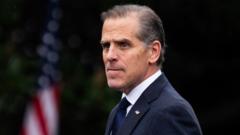As the deadline nears for President Trump's tariffs, Canada remains resolute in seeking a fair trade deal, with Carney indicating potential protective actions for key industries amid heightened tensions with the US.
Canada Stands Firm Against US Tariffs: 'No Bad Deals' Says Carney

Canada Stands Firm Against US Tariffs: 'No Bad Deals' Says Carney
Canadian Prime Minister Mark Carney asserts that the country will not accept unfavorable terms to secure a trade agreement with the US as the tariff deadline approaches.
Canadian Prime Minister Mark Carney has firmly stated that Canada will not compromise on a favorable trade deal with the United States, particularly as the August 1 deadline approaches, when President Donald Trump threatens to impose new tariffs. "Our objective is not to reach a deal whatever it costs," Carney emphasized during a press briefing in Ontario. With a potential 35% tax awaiting US importers if no agreement materializes, the tension between the neighboring countries remains palpable.
The US and Canada have long been significant trading partners, but relations have soured since Trump resumed his presidency, launching a series of tariffs aimed at bolstering American manufacturing and safeguarding jobs. Critics argue that this strategy disrupts the global economy, potentially raising costs for American consumers.
Trump has already enacted a sweeping 25% tariff on certain Canadian imports and has increased tariffs on aluminum and steel to 50%. Addressing the ongoing situation, Carney noted that the Canadian government might need to step in to support vital sectors like aluminum and lumber that are heavily impacted by the US tariffs, hinting at possible further protective measures.
Previously, Canada has responded with countermeasures, including higher tariffs on steel imports. "It will probably be the case in the next couple of months... we'll see other needs for support for the sectors that have been the most affected," said Carney during a gathering of provincial leaders.
Canada relies heavily on trade with the US, exporting approximately three-quarters of its goods, including significant volumes of metals, lumber, oil, vehicles, machinery, food, and pharmaceuticals. According to the Office of the US Trade Representative, in 2024 alone, the US exported nearly $350 billion worth of goods to Canada, while imports exceeded $412 billion.
Trump has implemented various tariffs across multiple product categories and countries, claiming that the US has not been treated justly by its foreign trading partners. His justification includes efforts to pressure neighboring countries to take action against illegal fentanyl shipments to the US. However, statistics from the US Customs and Border Patrol indicate that only 0.2% of fentanyl seizures in the US occur at the Canadian border, with the bulk originating from Mexico.
Since unveiling his tariff strategy, Trump has secured limited trade deals with countries such as the UK, Japan, and Indonesia, though most still maintain heightened tariff rates. Most recently, a deal was reached with the Philippines, raising tariffs on goods from there from 17% to 19%, although this remained below the 20% initially threatened by Trump.



















